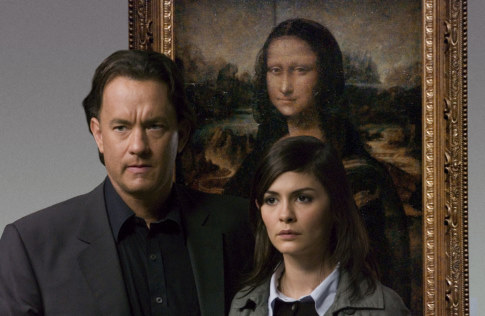

|
Da Vinci Code
3 out of 10 |
 |
|
Hanks' De Facto Moron
Topping the New York Times bestseller list for several months and selling millions of copies, Dan Brown's novel "The Da Vinci Code" proves that the public can't get enough of mysterious stories, even tepid, wishy-washy ones. Throw in a little art history and a few mysteries and apparently everyone is sold. Similar to the "Indiana Jones" trilogy or "Name of the Rose," the film and the book both present themselves as holding the keys to hidden secrets of art history, the Knights Templar, the Holy Grail and the history of the Catholic Church. Hungry for a new form of religion and spirituality, it has been devoured voratiously, particularly in North America, and of late has even been taken as truth, causing a scandal amongst religious circles. Brown has attempted to offer a explaination for some of the most common symbols of mankind and incredibly although both are as intellectually appealing and well-written as your average Hardy Boys novel, he has still managed to rake in a sizable audience. For afficinados of Brown's book or even just one of the curious, it is likely even with it's large budget and big name actors, most filmgoers will be disappointed in Ron Howard's unwieldy and uneven adaptation and venture into the sacred unknown. Starring Tom Hanks as a more scholarly version of the traditional Indiana Jones character, he plays the bookish but handsome Robert Langdon, a religious iconographer who while travelling in Paris on a lecture tour, becomes unwittingly a suspect the grisly death of Louve curator Jacques Sauniere. All suspense will end after this opening scene however, to be followed by some of the most dodgy and rushed acting to hit the screen in years. Possibly after reading first time solo screenwriter Avika Goldman's script, Howard decided to run through everything in one take before all actors realized the horrendous translation and abandoned the project. With it's hatchet job plot and quick explanations, it runs in a meadering way through the books chapters with waffly performances, poor elaborations, unbelievable conclusions and no chemistry between the characters, who are led haphazardly by Paul Betanny's terrifying Silas to a dreamy but rather empty conclusion. While both the picture and the book are thought provoking and contain some intreging ideas, they are unfortunately presented in a way that is too flat to be taken very seriously. Even with appearances from British acting great Ian McKellan as Sir Leigh Teabing and France's consumate police inspector Jean Reno as Captain Fache (Why is Jean Reno always the cop?) and the talented Audrey Tautou as Sophie Neveu, they only serve to show how flawed and pandering a production "The Da Vinci Code" is and how good it might have been. With a story that is never quite as intreging as "Holy Blood, Holy Grail" or as suspenseful as Umberto Eco's "Foucalt's Pendulm," you feel as if you are watching a family friendly dimestore romance version of what could have been a serious or thoughtful thriller. Although containing some impressive special effects and breathtaking settings, it is not an enjoyable or engaging picture and lacking a human connection or spirit, like botched "The Passion of the Christ" is to the masterpiece "The Last Temptation of Christ," it misrepresents itself as both plausible fact and good fiction. Opie Dei? So Dark The Con of Ron
Film Critic: Jennifer M Lillies
|
|